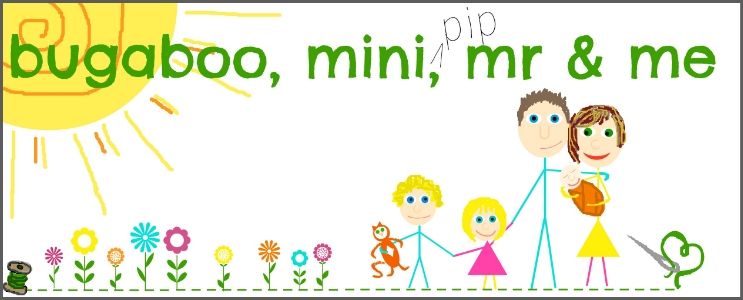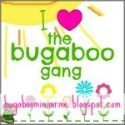An ongoing lesson I am learning from bug is: a completely new language. I call it Bugese, and it’s an off-shoot of common American English. I’d like to share a few of the finer points of this language for you - some of them have been hard lessons to learn, indeed.
First up, vocabulary: (this is not a comprehensive list)
owtah - airplane
pea cock - pea cock
pea cock - big truck
sucky - pacifier
lil-lull - little
beef cake - shepherd’s pie
peas - please
gank goo - thank you
gee gee - blankie (but not just any blankie. his special dinosaur blankie from Oma.)
mess owf - myself (usually exclaimed - with about three or four exclamation points)
parachute - firework (don’t ask...)
peese car - police car
zeba - zebra
bowzer - bulldozer
blender store - thunder storm (nope, I’m not kidding)
akinaseeno - "what is that?" (NO idea where this came from. It took us months to figure this one out...)
Second, grammar:
There are many subtleties to Bugese grammar. I will briefly summarize the most important rules.
1. The rules are extremely fluid as long as you are the one making them up. If you are not, they aren’t fluid AT ALL and you better say things EXACTLY right.
2. “You” means “me” except when it is referring to you. “Me” can refer to either “me” or “you”, depending on context. “Her” is actually “she” and “him” is usually “me.” (Ex: “Mommy help you?” “I listen to me.” “Her sad.”)
3. Anything and everything can be pluralized. Many things can be pluralized in one sentence, OR nothing can be pluralized when it should be, OR things that shouldn’t be pluralized can be. All of this depends on context and situation. (Ex: “Mommy turns the light offs.”)
Third, and this is the most important, I think, and also the hardest to learn, because it is so very subtle. You know those languages that rely so heavily on syllabic emphasis and such? It’s a lot like that:
(long, drawn out shrieking scream) - can mean “I am so incredibly mad at you.”
(long, drawn out shrieking scream) - can also mean “I am really tired but don’t want to go to bed.”
(long, drawn out shrieking scream) - also means “Wow, I’m happy to see you!”
(long, drawn out shrieking scream) - similarly means “I’m just so excited right now!”
(long, drawn out shrieking scream) - or “I’m really hungry, when are you going to feed me?”
(long, drawn out shrieking scream) - or “She took the car I was playing with and I’d like it back, please.”
(long, drawn out shrieking scream) - or it could also mean simply “long, drawn out shrieking scream.”
It really just depends. See what I mean about confusing?
I think I’m slowly getting better at this language. I was completely unsuccessful at learning Spanish (despite the four years of training), so I think I am making remarkable progress here. This could also be because, every day, bug is getting better and better at common American English.
I’ve also discovered a curious phenomenon. In spending time with K, I realized that she also has her own language - which I call K-ish. Now, while K-ish is, at times, similar to Bugese, it is a totally separate language - like Portuguese and Spanish. No... more like Laotian and Tongan. Or something... anyway, the point is, no matter how far along I got with Bugese, I was still stalled with K-ish. I know this is most likely because I spend more time with bug than K, but it was a little frustrating, for her AND me. But that’s not the curious phenomenon. The phenomenon is this: in those moments of pure and unadulterated confusion - nay irritation - when K and I simply could not communicate, after I had asked her “what???” for about the hundredth time, bug would come to the rescue and act as translator. “She want a banana,” bug would calmly explain. Or, “she lost her blankie.” It seems that bug can speak bugese, K-ish and (at times, and more and more frequently) English. He’s trilingual! Either that, or bugese and K-ish are actually much more alike than I thought and exist as homogenous dialects of a thoroughly widespread tongue - Toddlegog (not to be confused with Tagolog, the language spoken in the Philippines).
It may be some time before I am fluent in Bugese - and even longer before I master the intricacies of Toddlegog. I may never be able to grasp all of the subtleties of this intriguing vernacular. Fortunately, bug is a bright one and is learning my form of English at an almost alarming rate.
(Alarming? You wonder. Yes, alarming. As in when bug sees something particularly exciting at the park and practically yells, “Oh my gosh!” Or when we’re squashed into a public restroom stall and bug applauds me excitedly, offering much approbation with “You peed?!? Good job! Mommy peeing!” Or when we’re driving with my mom and pass a specific highway interchange and he explains to her, very seriously, “Mommy mad when they don’t yield.” If I’m not careful, his vocabulary will quickly expand enough to out all of my secrets.)
Notice, though, the deliberate use of the phrase “my form of English.” I feel my heart swell with pride when mr is putting bug to bed and I hear him correct from the other room, “no, bug. Not b-ayyyy-g. B-ahhhh-g. Bahg.”
Yes, bug is becoming more and more adept with American English - Northern Midwest Dialect - to mr’s chagrin.
Hm... what's this?
oooo, a tunnel!
Hi!
Phew! Made it!










































3 comments:
HILARIOUS. Or as K would say "la-yew-ee-us!"
Glad you liked it! :) so true, huh?
Hey, my kids still talk funny.
Post a Comment